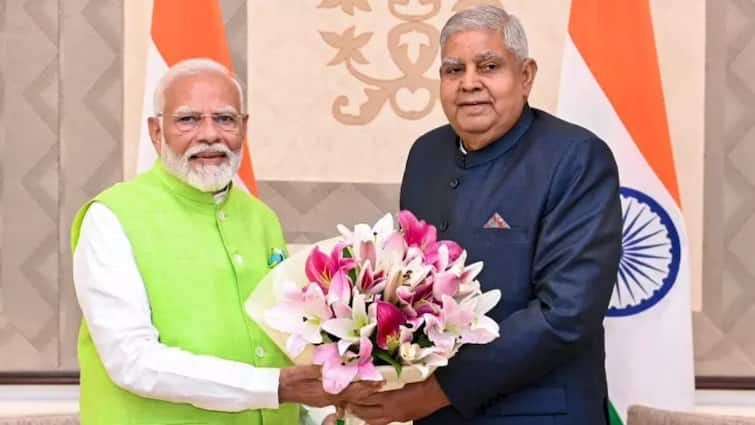Following Vice President Jagdeep Dhankhar’s sudden resignation late Monday, attention has shifted to the process of electing his successor. Dhankhar, who took charge as the 14th Vice President of India in 2022, stepped down with immediate effect, citing health concerns and the need to follow medical advice.
‘Effective Immediately’: Dhankhar Resigns Under Article 67(a)
In a letter submitted to President Droupadi Murmu, Dhankhar invoked Article 67(a) of the Constitution to step down from his post. “To prioritise health care and abide by medical advice, I hereby resign as Vice President of India, effective immediately,” the 74-year-old wrote.
With three years remaining in his term, his departure has triggered a constitutional requirement to fill the vacancy at the earliest. As per the Constitution, the Election Commission is expected to initiate the process soon.
The election of the Vice President is governed by Articles 63 to 71 of the Constitution and the Vice-President (Election) Rules, 1974.
What the Constitution Says About Filling a Vacancy
If the Vice President’s office becomes vacant due to death, resignation, removal or any other reason before the end of the five-year term, the Constitution mandates that the post be filled “as soon as possible”.
The election is conducted by an electoral college comprising members of both Houses of Parliament—Lok Sabha and Rajya Sabha—through a proportional representation system using a single transferable vote and secret ballot.
If the Vice President’s office becomes vacant before the completion of term, the Election Commission must organise elections without undue delay. The elected candidate assumes office for a full five-year term from the date they take charge.
Nomination Rules, Eligibility & Security Deposit
To contest the election, a candidate must be an Indian citizen, at least 35 years of age, and qualified to be elected to the Rajya Sabha. They must not hold any office of profit under the government.
As per the procedural rules, a candidate must be proposed by at least 20 Members of Parliament and seconded by another 20. A security deposit of ₹15,000 is also required, irrespective of how many nomination papers the candidate files—only up to four are accepted by the Returning Officer.
The nomination papers must be submitted at the designated place, date, and time as announced in the public notice issued by the Election Commission.
Vice President’s Role & Political Stakes
The Vice President is the second-highest constitutional authority in India and also serves as the ex-officio Chairperson of the Rajya Sabha. While not a member of either House or of any state legislature, the Vice President plays a critical role in maintaining parliamentary procedure in the Upper House.
Additionally, the Vice President discharges the duties of the President in the event of the President’s death, resignation, removal or incapacity, until a new President is elected.
With the office now vacant, political consultations are expected to intensify across party lines. The electoral college of 788 MPs—543 from Lok Sabha and 245 from Rajya Sabha—will be called upon to elect a new Vice President. The Election Commission is likely to announce the poll schedule soon.









